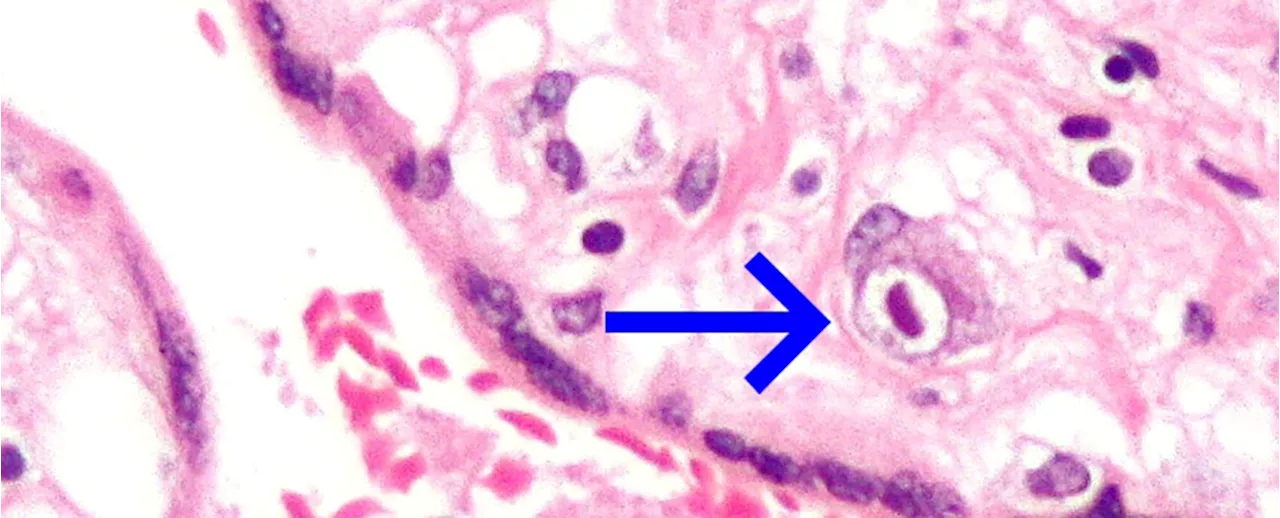A new study has found a link between the common herpes virus human cytomegalovirus (HCMV) and Alzheimer's disease. Researchers believe that HCMV may travel from the gut to the brain, potentially contributing to the development of the neurodegenerative disorder.
A new study has uncovered a potential link between human cytomegalovirus (HCMV), a common herpes virus, and Alzheimer's disease. The research, published on December 19th, suggests that HCMV might reside in the gut and later travel to the brain, potentially contributing to the development of the neurodegenerative disorder. HCMV is prevalent, with about one-third of Americans developing antibodies to the virus by age 5 and half infected by age 40.
While typically causing mild or no symptoms in healthy individuals, the virus remains in the body for life, controlled but not eradicated by the immune system. This persistence allows for potential reactivation, reinfection of the gut, and subsequent movement to the brain.The study, led by researchers at the University of California, San Francisco, examined brain tissue samples from 101 deceased individuals, 66 of whom had been diagnosed with Alzheimer's. They focused on a specific protein, CD83(+), found on microglia cells, which play a crucial role in brain health. The presence of CD83(+) in the brain tissue was strongly correlated with HCMV presence in the gut. Furthermore, experiments using brain organoids, laboratory-grown tissues resembling human brain cells, showed that HCMV infection accelerated the production of amyloid and tau proteins, both implicated in Alzheimer's disease.While the study's findings highlight a potential connection, it's crucial to remember that correlation doesn't necessarily equate to causation. More research is needed to determine if HCMV directly causes Alzheimer's disease and to identify the factors that trigger its reactivation and movement to the brain. Nevertheless, this study adds to the growing body of evidence suggesting that chronic gut infections, including those caused by herpes viruses, may contribute to the development of Alzheimer's disease decades before symptoms appear.
ALZHEIMER's DISEASE CYTOMEGALOVIRUS GUT-BRAIN CONNECTION NEURODEGENERATION VIRUS
United States Latest News, United States Headlines
Similar News:You can also read news stories similar to this one that we have collected from other news sources.
 HCMV and Immune Response Linked to Alzheimer'sA new study suggests a connection between the human cytomegalovirus (HCMV), the immune response triggered by CD83 antibodies, and Alzheimer's disease (AD). Researchers found that individuals with AD had elevated levels of HCMV and IgG4 in their tissues, particularly in the brain and gut.
HCMV and Immune Response Linked to Alzheimer'sA new study suggests a connection between the human cytomegalovirus (HCMV), the immune response triggered by CD83 antibodies, and Alzheimer's disease (AD). Researchers found that individuals with AD had elevated levels of HCMV and IgG4 in their tissues, particularly in the brain and gut.
Read more »
 5 Gut Conditions Linked to Alzheimer's DiseaseA new study published in Communications Biology reveals a link between at least five gut conditions and Alzheimer's disease. The research, which analyzed genetic data from over 400,000 people, suggests that individuals with these gut disorders may be at a higher risk of developing AD.
5 Gut Conditions Linked to Alzheimer's DiseaseA new study published in Communications Biology reveals a link between at least five gut conditions and Alzheimer's disease. The research, which analyzed genetic data from over 400,000 people, suggests that individuals with these gut disorders may be at a higher risk of developing AD.
Read more »
 The surprising role of gut infection in Alzheimer's diseaseResearchers have discovered a surprising link between a chronic gut infection caused by a common virus and the development of Alzheimer's disease in a subset of people. It is believed most humans are exposed to this virus -- called cytomegalovirus or HCMV -- during the first few decades of life.
The surprising role of gut infection in Alzheimer's diseaseResearchers have discovered a surprising link between a chronic gut infection caused by a common virus and the development of Alzheimer's disease in a subset of people. It is believed most humans are exposed to this virus -- called cytomegalovirus or HCMV -- during the first few decades of life.
Read more »
 CMV Virus Found Linked to Alzheimer's Disease SubtypeA new study suggests a potential link between cytomegalovirus (CMV) and a subtype of Alzheimer's disease. Researchers found active CMV in the gut of some individuals, potentially traveling to the brain via the gut-brain axis and contributing to inflammation that could worsen Alzheimer's symptoms. This discovery raises hopes for preventive measures using antiviral drugs and blood tests to detect active CMV infection.
CMV Virus Found Linked to Alzheimer's Disease SubtypeA new study suggests a potential link between cytomegalovirus (CMV) and a subtype of Alzheimer's disease. Researchers found active CMV in the gut of some individuals, potentially traveling to the brain via the gut-brain axis and contributing to inflammation that could worsen Alzheimer's symptoms. This discovery raises hopes for preventive measures using antiviral drugs and blood tests to detect active CMV infection.
Read more »
 Herpes virus might drive Alzheimer's pathologyViral infections may play a role in Alzheimer's disease.
Herpes virus might drive Alzheimer's pathologyViral infections may play a role in Alzheimer's disease.
Read more »
 Head Injuries May Trigger Alzheimer's and Dementia by Re-Awakening Dormant VirusScientists have discovered a potential link between repeated head injuries and the development of Alzheimer's disease and dementia. A study using 3D human brain tissue models found that mild blows to the brain could reactivate a dormant herpes simplex virus (HSV-1), leading to the formation of harmful proteins and triggering the hallmarks of Alzheimer's.
Head Injuries May Trigger Alzheimer's and Dementia by Re-Awakening Dormant VirusScientists have discovered a potential link between repeated head injuries and the development of Alzheimer's disease and dementia. A study using 3D human brain tissue models found that mild blows to the brain could reactivate a dormant herpes simplex virus (HSV-1), leading to the formation of harmful proteins and triggering the hallmarks of Alzheimer's.
Read more »
